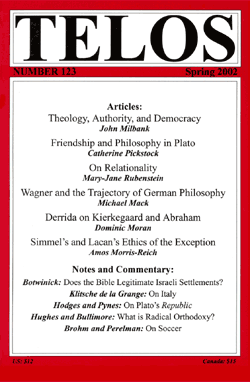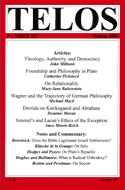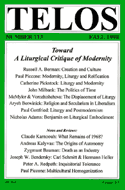Luigi Sturzo (1871–1959) was an Italian priest, social reformer and the founder in 1919 of the Popular Party that later became the Christian Democratic Party, and social theorist who wrote extensively about history during the last century. Regarding history, Sturzo’s great contribution is his account of the formation and development of the “International Community” as one of the concrete forms of human society subject to its general laws. Sturzo locates the roots of this concept in the Christian revelation of human equality before God and the subsequent religious duty to love one’s neighbor in a manner that transcends the traditional boundaries of the ancient world. Thus the social values of the pre-Christian world are inverted, and human personality assumes the mantle previously held by the social and ethnic bonds of that era.
|
However improbably, Michel Houellebecq’s novel Soumission returns continually to the work of Joris-Karl Huysmans for inspiration, if one can call it inspiration, this exercise in disillusionment seeking its literary echo. All the more surprising is Houellebecq’s insistence on a view of Huysmans that scarcely anyone, even those who have read his best work, will recognize, despite its being scrupulously accurate in its biographical and literary detail. When Huysmans is read today, it is almost invariably as the quintessential Decadent of À rebours, which Houellebecq touches upon only lightly when he declares it a masterpiece and then declines to discuss it in any meaningful way except to ask where one goes, where Huysmans went, where Houellebecq’s protagonist François might go, when his best work, his greatest inspirations, and his greatest dissipations are behind him. “In the case of Joris-Karl Huysmans,” the protagonist worries, “the obvious problem was what to do with À rebours. Once you’ve written a book of such powerful originality, unrivaled even today in all of literature, how do you go on writing?” Houellebecq even seems to be inviting us to contemplate his own midlife crisis as a novelist and wonder if, after writing the great novel of cynicism in our time, after exploring in painful detail better than anyone else all the great whatevers of modern anomie, he has simply run out of fresh disillusionments to anatomize in prose. His answer to his own question is quite simply Durtal, Huysmans’ other great literary accomplishment, the autobiographical alter ego around whom he focalized a series of somewhat mystical, somewhat Naturalistic, somewhat Decadent novels of Catholic conversion that occupied him for much of the two decades that followed the success of À rebours. Michel Houellebecq’s novel Submission raises important questions about the cultural crises of modernity. It reflects on the dialectics of post-secularism and post-democracy in ways that have become particularly salient in light of the terror attacks in Paris and San Bernadino. Beginning with Vincent Lloyd’s post today, TELOSscope presents a series of discussions of the novel that will appear over the next several days. The violence of November 13, 2015, in Paris was met with an avalanche of grief and sympathy from around the world. Similar feelings followed the attack on Charlie Hebdo several months earlier. Paris is an iconic and beloved city; to see blood and bullet holes on the streets of Paris caused pain. Or rather, it causes professions of emotion. In an age of personal mediation, when we are expected to advertise our feelings about world events nearly in real time through tweets and Facebook posts, it is an open question how much feelings are felt—though they are most certainly performed. Affect circulates with ever increasing velocity, but such affect is increasingly shallow, more like a shared way of talking than anything having to do with inwardness. This does not mean mediated emotions are insignificant. As leftist critics of such public mourning charge, shared ways of talking about the world lead to shared ways of seeing the world and can ultimately legitimate violent ways of acting in the world.
In their article “What is Radical Orthodoxy?” (Telos 123, Spring 2002), John Hughes and Matthew Bullimore map out, in a short space and yet with crisp detail, the main themes in the Radical Orthodoxy project. For those familiar with the movement, their points will not come as a shock: that a deep metaphysical violence underlies modernity, political liberalism, and capitalism; that the philosophical and theological dualisms of modernity must be named and then overcome with the aid of both premodern and postmodern thought; and that in the face of proliferating violence it is Christian orthodoxy—in line with Aquinas, Boethius, Augustine, Gregory of Nyssa, and Iamblichean Neo-Platonism—that presents truly “radical” alternatives to the prevailing political, philosophical, and theological orders. |
||||
|
Telos Press Publishing · PO Box 811 · Candor, NY 13743 · Phone: 212-228-6479 Privacy Policy · Data Protection Copyright © 2025 Telos Press Publishing · All Rights Reserved |
||||
 Mention “Radical Orthodoxy” in a room of people who are either quite intimately or only remotely acquainted with contemporary theology, and one surely will receive equal parts of praise and scorn. Whether it is being praised or scorned, however, it is plain that Radical Orthodoxy has worked its way deep into the fabric of contemporary theological discourse. Since the publication of John Milbank’s Theology and Social Theory in 1992, Catherine Pickstock’s After Writing in 1997, and Radical Orthodoxy: A New Theology, edited by Milbank, Pickstock, and Graham Ward in 1998, the Radical Orthodoxy movement has done what any explosively innovative intellectual movement will do after the hype settles down: mature or wither away.
Mention “Radical Orthodoxy” in a room of people who are either quite intimately or only remotely acquainted with contemporary theology, and one surely will receive equal parts of praise and scorn. Whether it is being praised or scorned, however, it is plain that Radical Orthodoxy has worked its way deep into the fabric of contemporary theological discourse. Since the publication of John Milbank’s Theology and Social Theory in 1992, Catherine Pickstock’s After Writing in 1997, and Radical Orthodoxy: A New Theology, edited by Milbank, Pickstock, and Graham Ward in 1998, the Radical Orthodoxy movement has done what any explosively innovative intellectual movement will do after the hype settles down: mature or wither away.  In his article “The Last of the Last: Theology, Authority, and Democracy,” from Telos 123 (Spring 2002), John Milbank argues that theology’s proper role is within the Church extended through time and space, rather than as “‘a public discourse’ answerable to the critical norms and liberal values.” Yet his claim does not come without qualification. Many aspects of theological inquiry that were once held together have splintered since 1300 CE: faith and reason, scripture and tradition, and theology under ecclesial authority, in particular. Here the Church is actually more to blame, both Protestantism and Post-Tridentine Catholicism, than some (fictional) increasingly enlightened and liberated society.
In his article “The Last of the Last: Theology, Authority, and Democracy,” from Telos 123 (Spring 2002), John Milbank argues that theology’s proper role is within the Church extended through time and space, rather than as “‘a public discourse’ answerable to the critical norms and liberal values.” Yet his claim does not come without qualification. Many aspects of theological inquiry that were once held together have splintered since 1300 CE: faith and reason, scripture and tradition, and theology under ecclesial authority, in particular. Here the Church is actually more to blame, both Protestantism and Post-Tridentine Catholicism, than some (fictional) increasingly enlightened and liberated society.  Catherine Pickstock’s “Liturgy and Modernity,” from Telos 113 (Fall 1998), is an effort to find an alternative to liberal individualism and social fragmentation in modernity. Pickstock finds this alternative in liturgy: a liturgical critique of modernity where “liturgy” functions as a thoroughly political category. Liturgy is specially equipped to confront modernity due to its nature as ritual behavior (and therefore universal among humans). Yet the liturgical is to be favored over “ritual” for two reasons. First, ritual has already been relegated to its own “delimited sphere” in modernity, where it is viewed as a private superstructural category. Furthermore, ritual in the modern mind is regarded merely as “mechanical repetitions divorced from any informing narrative.” Liturgy, on the other hand, responds to the former challenge by its nature as “a pattern of social action” (not a delimited sphere) and responds to the latter by its foundation in a “privileged transcendent signifier.”
Catherine Pickstock’s “Liturgy and Modernity,” from Telos 113 (Fall 1998), is an effort to find an alternative to liberal individualism and social fragmentation in modernity. Pickstock finds this alternative in liturgy: a liturgical critique of modernity where “liturgy” functions as a thoroughly political category. Liturgy is specially equipped to confront modernity due to its nature as ritual behavior (and therefore universal among humans). Yet the liturgical is to be favored over “ritual” for two reasons. First, ritual has already been relegated to its own “delimited sphere” in modernity, where it is viewed as a private superstructural category. Furthermore, ritual in the modern mind is regarded merely as “mechanical repetitions divorced from any informing narrative.” Liturgy, on the other hand, responds to the former challenge by its nature as “a pattern of social action” (not a delimited sphere) and responds to the latter by its foundation in a “privileged transcendent signifier.” 

